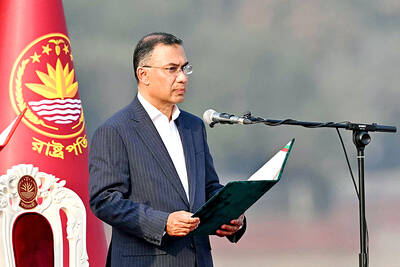Singapore kicked off a global rush to develop contact tracing apps for the novel coronavirus when the city-state launched an apparently new system in March, but the project actually drew inspiration from a 2014 US high school project that won an international prize, but found no backers — until now.
It all started when Rohan Suri created an app at Thomas Jefferson High School in Alexandria, Virginia, to tell his mom to leave home for the bus stop when he was seven minutes away.
As the Ebola epidemic ravaged western Africa at the time, Suri and schoolmate Claire Scoggins connected the dots between tracking apps and contact tracers who ask patients whom they may have spread viruses to.
“I got really interested in basically automating a lot of these contact tracing efforts,” Suri said, citing a staff shortage in parts of Africa during the Ebola epidemic.
When Suri and Scoggins developed a prototype called kTrace, they appealed to medical aid organizations and the US government to bring it to the front lines.
However, they found no takers, even after winning third place for systems software at the 2015 International Science and Engineering Fair.
The app languished until Suri, now a 21-year-old junior at Stanford University, got an e-mail on Jan. 24 from Jason Bay, a Stanford alum and senior director at Singapore’s Government Technology Agency (GovTech).
“My mom had texted me saying: ‘You’ve got to look at this virus in Wuhan and do something about it,’” Suri said. “I didn’t take it seriously, though, and week later the Singapore government is reaching out.”
Bay’s team had been looking for technology to help curb the spread of COVID-19 and came across kTrace online.
Suri spent February and March volunteering on GovTech’s TraceTogether app, alongside fellow Stanford students Nikhil Cheerla and Daniel Lee.
They said they gave Singapore a roadmap by sharing kTrace’s code and providing advice in virtual meetings on stronger privacy protections.
Singapore was “just looking around for any way to speed up the development process and we fit in,” Cheerla said.
The agency said that it contacted Suri “to understand his experiences and considerations in designing kTrace for Android.”
However, Suri “did not commit code to TraceTogether, nor did [GovTech] use kTrace in the development of TraceTogether,” it said.
University scientists Kate Farrahi and Manuel Cebrian said their studies as early as 2011 were the first to show Bluetooth readings could aid contact tracing, but they did not develop an app, and Suri had not seen their work in high school.
Since Singapore’s app launched, several dozen governments, including Australia, Britain and US states such as North Dakota, have spent millions of dollars among them to develop separate tracing apps.
Many other governments are monitoring progress in Singapore, where about 25 percent of its 5.6 million residents have downloaded TraceTogether.
Contact tracing apps aim to slow the spread of viruses by identifying secondhand infections more quickly than through interviews, but privacy concerns are a hurdle, and the technology does not work well on iPhones.
Singapore has adopted a costly solution: Giving residents small tracing gadgets that do not require smartphones.
Suri said he, too, had developed a wearable device in high school, because Ebola infections were highest in countries with low smartphone ownership.
Suri is now focusing on a third app called Zero, aimed at US cities.
The day after TraceTogether launched, a friend who knew about Suri’s involvement introduced him to some New York entrepreneurs and venture capitalists seeking to bring similar technology to the US.
They ended up cofounding Zero, which aims to attract users by bundling contact tracing technology with a safety-rating tool for shops and restaurants.

Heavy rain and strong winds yesterday disrupted flights, trains and ferries, forcing the closure of roads across large parts of New Zealand’s North Island, while snapping power links to tens of thousands. Domestic media reported a few flights had resumed operating by afternoon from the airport in Wellington, the capital, although cancelations were still widespread after airport authorities said most morning flights were disrupted. Air New Zealand said it hoped to resume services when conditions ease later yesterday, after it paused operations at Wellington, Napier and Palmerston North airports. Online images showed flooded semi-rural neighborhoods, inundated homes, trees fallen on vehicles and collapsed

‘COST OF DEFECTION’: Duterte’s announcement could be an effort to keep allies in line with the promise of a return to power amid political uncertainty, an analyst said Philippine Vice President Sara Duterte yesterday announced she would run for president of the Southeast Asian nation of 116 million in 2028. Duterte, who is embroiled in a bitter feud with Philippine President Ferdinand Marcos Jr, was impeached last year only to see the country’s Supreme Court throw the case out over procedural issues. Her announcement comes just days before her father, former Philippine president Rodrigo Duterte, begins a pretrial hearing at the International Criminal Court (ICC) in the Netherlands over crimes against humanity allegedly committed as part of a brutal crackdown on drugs. “I offer my life, my strength and my future

NOT YET THERE: While the show was impressive, it failed to demonstrate their ability to move in unstructured environments, such as a factory floor, an expert said Dancing humanoid robots on Monday took center stage during the annual China Media Group’s Spring Festival Gala, China’s most-watched official television broadcast. They lunged and backflipped (landing on their knees), they spun around and jumped. Not one fell over. The display was impressive, but if robots can now dance and perform martial arts, what else can they do? Experts have mixed opinions, with some saying the robots had limitations and that the display should be viewed through a lens of state propaganda. Developed by several Chinese robotics firms, the robots performed a range of intricate stunts, including martial arts, comedy sketches and choreographed

POST-UPRISING: Bangladesh Nationalist Party lawmakers were yesterday expected to formally elect Tarique Rahman as their leader and new head of government Bangladesh’s prime minister-to-be Tarique Rahman and lawmakers were yesterday sworn into parliament, becoming the first elected representatives since a deadly 2024 uprising. Rahman is set to take over from an interim government that has steered the country of 170 million people for 18 months since the autocratic government of Sheikh Hasina was overthrown. The lawmakers, who promised loyalty to Bangladesh, were sworn in by Chief Election Commissioner AMM Nasir Uddin. Bangladesh Nationalist Party (BNP) lawmakers are expected to formally elect Rahman as their leader, with President Mohammed Shahabuddin then to administer the oath of office to the prime minister and his ministers